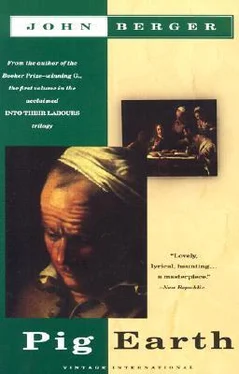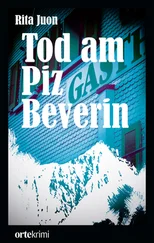The work which remained to be done was now more divided and less anxious. We had to lift the purlins, the beams which run the length of the roof, into their positions, fit their joints and nail them. Every purlin was numbered with a numeral, written as André Masson had taught us all at school, and every joint was indicated twice on each piece of wood, with a capital letter. Some of the dead were on ladders and some worked on the ground. They made more comments than before and more jokes. Those on the ground fixed temporary bars at an angle to the future walls, like buttresses. Along these they pushed and pulled the purlins up with ropes.
The first to be fixed in place was the lowest, the timber bordering the overhanging roof. Against the wall beneath this overhanging roof, the wood for the stove would be stacked, sheltered from the snow and the rain. Against the southern wall protected by the roof she’d plant lettuces and parsley, and, along the edge of the same bed, multi-coloured pansies, which have the colours of most of the precious stones in the world. Under the roof behind the first purlin, sparrows would nest and on the posts of the fence, for which the stakes have not yet been cut or pointed, a pair of crows would sit, waiting for her to come out to feed the chickens. I heard her calling them.
She took my hand in her stiff, calloused, grabbing, picking, old woman’s hand. It was no longer possible for me to think of her as young.
There is no need for you to work, she said, they have enough help, we can sit in the sun.
And the food? I asked. Is everything prepared?
Everything.
I don’t see any tables or benches.
They are in the church, it’ll only take a minute to bring them out.
At her funeral when people were still filing out of the cemetery, the Mayor told the local veterinary surgeon: And so we gave her the roadmender’s house, it was the best we could think of. You have to reckon with the fact that if she’d lived in a city, she would certainly have been put in an institution many years ago …
Look! she said, tapping my shoulder, they will soon be finished.
We were sitting there side by side, watching the mountains, and the men working. We were the eldest, all the working dead were younger than us. The Cocadrille’s features and the backs of my own hands were a reminder of our age. The Cocadrille was sixty-seven when she was murdered, and I was three years older.
So, my contraband, I’ve smuggled you here, she said. An unlit cigarette was stuck to her lower lip which protruded and was blueish from the blueberries she had eaten.
The feeling of endless promise such as I hadn’t experienced since I was young bore me up, cradled me. I saw my father making rabbit hutches, and myself handing him the nails. I must have been eleven the year when, under my mother’s careful supervision, I bled and skinned my first rabbit. At the catechism class the Cocadrille knew by heart the answers I could not remember.
What is avarice?
Avarice is an excessive longing for the good things of life and particularly money.
Is love of the good things of life ever justified?
Yes, there is a justified love of the good things of life and this love inspires foresight and thrift.
On feast days in the Argentine the peones killed and ate turkeys: emigration offered me no new promises. The promise of the Place d’Etoile and the promise of the Arenne Corrientes in Buenos Aires were simply revivals of what I had already hoped in the village. I couldn’t have imagined those places from the village, yet I did imagine my pleasure, the same pleasure they promised and didn’t give me.
Pleasure is always your own, and it varies as much and no more than pain does. I had become accustomed to pain, and now to my surprise the hope of pleasure, the hope I had known when I was eleven, was coming from the old woman with the unlit cigarette who called me her contraband. Where had my life gone? I asked myself.
The dead were nailing the rafters. By the time all forty were in place, the sun was low and the bars of the roof cast a shadow on the grass beside the chalet which looked like a dark cage. The bars were the shadows.
Do you want to nail the bouquet? shouted Marius à Brine.
She waited for me to answer. I could feel her gaze through her half-shut eyes. The force of my reply surprised me.
From the corner of each of her puckered, squeezed eyes a tear came like juice. She crossed her arms to grasp her flat chest with her stiff hands. Her mouth stretched in a smile. Her tears ran down the deep lines to the corners of her mouth and she licked her upper lip.
Go, she said to me.
Marius handed me the hammer and the nails and I walked over to the foot of the first ladder. There was Georges, who hanged himself because he knew he was to become a pauper and would be sent in the winter to the old people’s hostel where half the inmates were incoherent. The money to build this hostel had been donated by a rich engineer from the region who had built many bridges for roads and railways far away. Georges planned his suicide as carefully as the engineer planned his bridges, he fixed a hooked wire to a tall wooden pole, ran the wire down it and with the help of this pole touched a high-tension wire, near the centre of the village, in a place where he would disturb no one. At the instant he died, all the lights in the village went out. Now Georges handed me the spruce to which he had attached the yellow and white paper flowers shaped like roses. With this bouquet across my shoulder, like a sweep’s brush, I climbed the ladder, which Georges held for me.
At the top a man I did not know was sitting on a cross beam. He put out his hand to steady me as I stepped off the ladder. I shook my head. It was a long time since I’d been on a roof and I needed no help. Like all of us I was born to it. Why were so many of us obliged to go to Paris as chimney sweeps? We lived on a roof; almost the first steps we take are on slopes as steep as our roofs. As long as I can climb up a ladder and lift one foot above the next, I need no help.
Who are you? I asked, you’re not from here.
Lucie knew me as Saint-Just, he replied.
You were in the Maquis!
We were ordered to dig our graves and we were shot.
I will tell you something, I said. There were Nazis who escaped after the Liberation and came to the Argentine, they changed their names and they lived off the fat of the pampas.
They only escaped for a moment.
You can’t be so sure, can you?
Justice will be done.
When?
When the living know what the dead suffered.
He said this without a trace of bitterness in his voice, as if he had more than all the patience in the world.
I climbed a second ladder with the tree across my shoulder, and sat astride the roof. There was a slight breeze; I felt it on my forearms. I could see the trees in the forest. In the east the snow on the mountains was turning a very diluted rose, no redder than the water of a stream when an animal has been killed. I looked down through the open roof into the upturned faces of the dead who had assembled to watch what I was going to do.
It was then that I noticed the band. They were standing at the end of the chalet, by the first frame. They were like the band I had joined as a drummer when I was fourteen. The band that played the soldiers out of the village. The sun was by now too low in the sky for the brass and silver instruments to dazzle. Their metals shone only dully like water in a mountain lake.
I began to make my way — not without some difficulty — along the ridge of the roof. When I reached the end, I looked down on the upturned faces; they were grinning like skulls. I lifted the tree off my shoulder and held it upright. What I had to do now was to nail it to the king-post. Suddenly from behind two thin arms clasped me round the ribs.
Читать дальше












